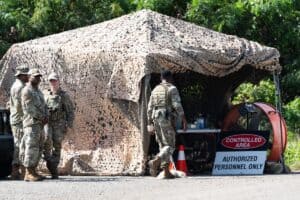Campaigning for Venezuela's July 28 presidential elections opens amid accusations of political persecution against Maduro.

Campaigning for the July 28 presidential elections officially opened in Venezuela amid great uncertainty Thursday, with incumbent Nicolas Maduro accused of political persecution.
“We are winning and winning big, but nobody should be complacent,” Maduro told a sea of followers at a rally in the capital Caracas.
To the opposition, which has accused his government of an authoritarian crackdown on dissent, Maduro said: “Get ready for the beating we’re going to give you!”
Many supporters donned the color red and carried images of roosters, a symbol of the “chavismo” ideology embodied by former Venezuela president Hugo Chavez.
“[I’m] with Maduro until the sea dries up,” Sandra Salazar, a 55-year-old coffee trader at the rally, told AFP.
Opposition candidate Edmundo Gonzalez Urrutia meanwhile rode through his own sea of supporters in Caracas, accompanied by the popular opposition leader Maria Corina Machado.
ALSO READ: Venezuelan man, world’s oldest, dies at 114
“Today begins the rebirth of hope and the road to change for Venezuela,” he said to reporters from his caravan.
The hopeful message has inspired many in Venezuela who have felt beaten down by Maduro’s tenure, which has seen a historic economic crisis that has led millions to flee the country.
“I feel like we are already free, Venezuela ended the dictatorship, Edmundo for the whole world!” said Raiza Ramirez, a 52-year-old nurse.
The rallies were held a day after the UN rights chief warned of an “increase in threats, harassment and assaults against civil society actors, journalists, unionists and other voices considered critical” in Venezuela.
The opposition group has reported the arrests of about 40 political and social activists so far this year.
And in April, the rights group Foro Penal warned of a “significant intensification of… persecution” in Venezuela.
ALSO READ: Venezuela suspends UN rights office, expels staff
The government accuses the opposition of conspiring against Maduro, whose reelection in 2018 was rejected as illegitimate by most Western and Latin American countries.
Now seeking a third successive term, Maduro vowed Thursday at a rally in the state of Zulia, before heading to Caracas, that “on July 28, we will win a crushing victory.”
Many Venezuelans are fearful the government will not recognize a victory by the opposition party, which currently leads in opinion polls.
“It is one thing to win the electoral process and, of course, another thing is recognition” of the outcome, said Guillermo Tell Aveledo, a political science professor at the Metropolitan University.
“The possibility of some type of repudiation (of the results) … or obfuscation of the popular will is very much on the table,” he added.
Crackdown
Gonzalez Urrutia, in a video released Thursday, urged Venezuelans to “convert the desire for change into votes.”
ALSO READ: Gold and mercury, not books, for Venezuela’s child miners
The previously unknown diplomat is standing in Machado’s place, after she was barred from running despite overwhelmingly winning a primary last year.
Her candidacy was scrapped by courts loyal to Maduro on charges of corruption that were widely dismissed as spurious, and for supporting Western sanctions against the regime.
The opposition says individuals and businesses seen as supporting Machado — including food vendors who sold her breakfast, a fisherman who helped her cross a river and hotels where she had stayed — have been shuttered or had their livelihoods seized by authorities.
Machado, who has been banned from traveling by plane, has traversed the country ahead of the official campaign urging support for Gonzalez Urrutia, receiving enthusiastic welcomes.
For his part, Maduro has in recent weeks visited cities and towns with promises of economic recovery in the crisis-battered country from which more than seven million have fled in recent years — about a quarter of the population.
He has also made regular appearances on state television, both as himself and as his anti-imperialist cartoon alter-ego Super-Bigote (Super-Mustache).
ALSO READ: ‘Look brave’: Children taught bullfighting at Venezuelan torero school
On Wednesday, Caracas announced a resumption of talks with the United States and an agreement to “improve relations.”
The United States had suspended some sanctions on Venezuela’s oil industry after Maduro’s government and the opposition agreed in Barbados last October to hold a free and fair vote in 2024 with international observers present.
But the thaw ended when Machado and other opponents were barred from running, and EU observers were uninvited. The sanctions were put back in place in April.
An election rehearsal on Sunday was overseen by observers from the US-based Carter Center and a UN panel of experts.
Neighboring Brazil and Colombia have added their voices to the call for the July 28 vote to be free, fearing another migration wave into their territories.
“We are working to ensure that the elections… are recognized, mainly by Venezuelans themselves,” Gisela Padovan, Brazilian foreign ministry secretary for Latin America and the Caribbean, said on Wednesday.
ALSO READ: Venezuela state TV president slams YouTube ‘censorship’
– By: © Agence France-Presse






